This post contains affiliate links. We may get paid an affiliate commission if you buy something or take an action after clicking one of the links on this web page.
Everyone who has been around the knife industry for a while knows Doug Ritter. Doug is the founder and chairman of Knife Rights, an advocacy organization that promotes pro-knife legislation and opposes anti-knife legislation, and they also work to pursue knife owner civil rights. It’s a hugely important organization for knife owners and the industry. Doug is truly one of the pillars of the knife community.
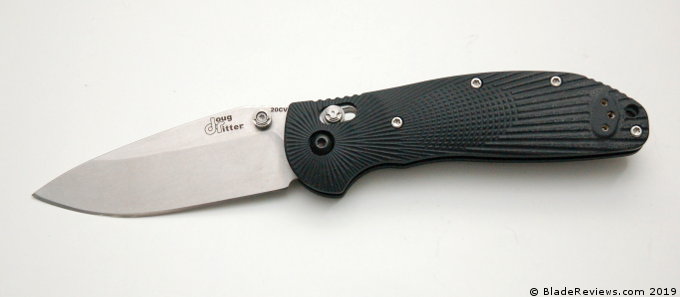
And one of the ways Doug has been able to serve as that pillar is through the sale of his RSK MK1, which was commonly referred to as a Ritter Griptilian. The revenue from selling that knife gave Doug the financial freedom to pursue Knife Rights. Many folks preferred the high flat grind on the MK1 over the standard Griptilian. I had a MK1 with a set of Wilkins Grips. That was a super cool knife.
Somewhat shockingly, in 2016 Benchmade told Doug they would no longer make the MK1. So he had to turn to other manufacturers. He ended up partnering with Hogue, and the result is the RSK MK1-G2. You can read more about this on the KnifeWorks listing. I wasn’t aware of this background info and thought it was interesting.
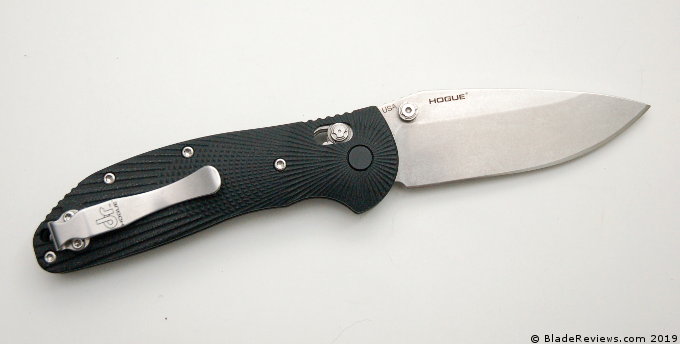
When Doug approached me about reviewing the knife I jumped at it. I have been getting picky about what knives I review, as I haven’t had as much time to write recenetly, but as a fan of Hogue, Doug, and the original Ritter Grip, this is one I had to check out.
This review sample was provided free of charge. I’ll do my best to keep this review as objective as I can. After the review, I will keep this knife for long term testing and evaluation.
General Dimensions and Blade Details
The MK1-G2 has an overall length of 8.15″, a 3.44″ blade, weighs 4.5 ounces, and is made in the USA. This is about the same dimensions of the original MK1. The MK1-G2 is approximately .7 ounces heavier, thanks in part to full G10 handle scales. The knife feels substantial. Not a boat anchor, but not an ultra-lightweight knife like the recently reviewed Para 3 LW. Doug has designed this with outdoor use / survival in mind, but I have carried the knife as an EDC piece. That’s the lens I’ll be examining it from.
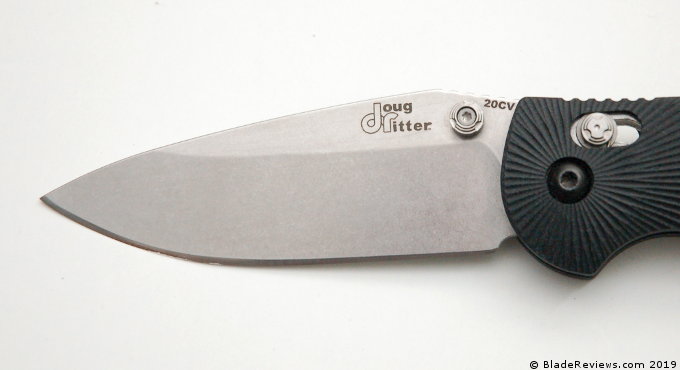
The blade features the same wide drop point profile of the original MK1. The 2.92mm thick blade comes with a high flat grind, and a sweeping belly. The finish is a heavy stonewash. The edge bevel is wide and perfectly even.
Doug and Hogue selected Crucible CPM-20CV, a high end powered steel which is chemically similar to Boeller M390. Here is a link to the datasheet on CPM-20CV if you want to do some further reading. I’ve owned a number of knives in CPM-20CV at this point, and have been pleased with the blend of stain resistance, edge retention, ease of sharpening, and toughness. CPM-20CV is simply one of the best blade steels on the market currently, so it’s great to see it on this knife.
Here is a size comparison with a Delica and Endura:
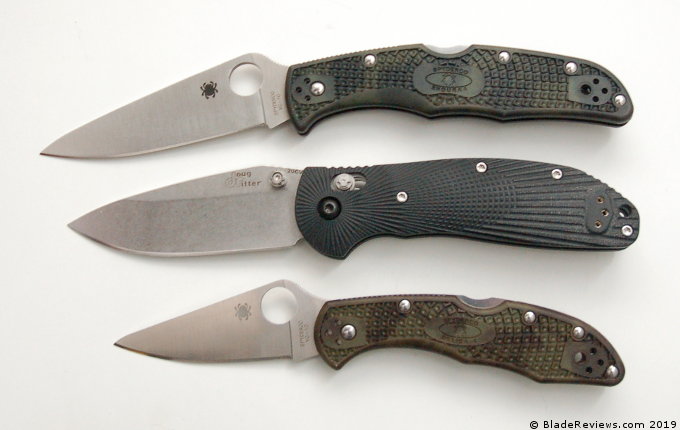
Hogue is known for sending blades out of their factory with mirror polished edges. Mine came with a highly polished edge, and the blade was surprisingly sharp, even for someone like me who regularly handles sharp knives. That edge combined with the thin flat grind makes the MK1-G2 a beast to cut with. It slipped through cardboard, and cleanly sliced apples. I’ve used it on a few projects inside and outside of the house. I did a little carving with the knife for grins, and the blade zipped long peels of wood off a 2×4.
If you are looking for a solid performing folding knife, it’s going to be tough to beat the geometry of the MK1-G2. Combine that with CPM-20CV and you have a potent package.
Handle, Ergonomics, and Pocket Clip
The handle of the MK1-G2 is made of 3-D machined G-10. Gone is the old “cheap plastic” handle of the Griptilian. In it’s place is black G-10, fully machined. They really went all out, with a sunburst pattern around the pivot, blending into a patch of checkering, and then the sunburst picks back up again and radiates down the handle.
The handle itself is contoured. Inside, partial steel liners have been flush mounted into the G-10 handles. Everything is held together with torx bolts and 3 metal standoffs. All the machining is top notch and the fit and finish is excellent.
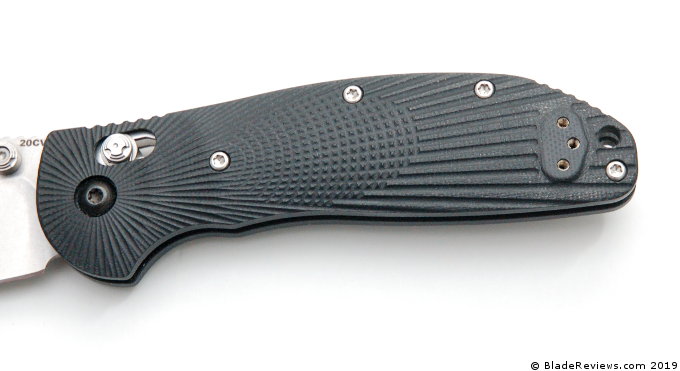
The MK1-G2 benefits from a practical handle design, and the knife has good ergonomics. The edges of the handle are square, so the knife doesn’t quite melt into the hand like a Griptilian, but it’s still comfortable thanks in part to the simple design and contoured handles.
There is also plenty of traction. The handle is obviously heavily textured, and there is jimping on the spine and pommel. There is a large thumb ramp, and the jimping isn’t overly aggressive. All in all, this is a handle designed for extended use. It’s practical and comfortable.
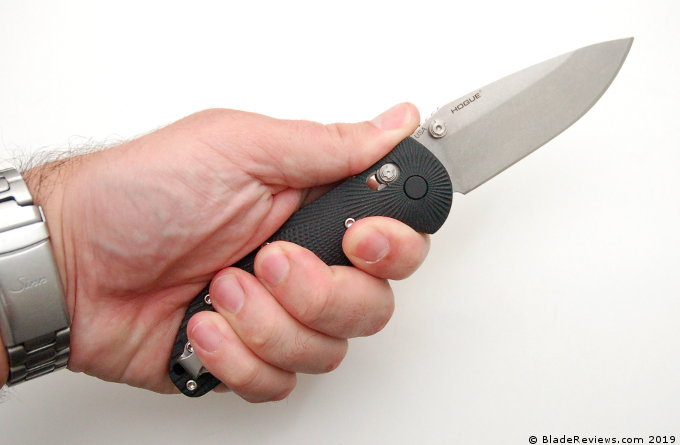
The MK1-G2 utilizes a deep carry spoon style clip. The clip has been given a tumbled finish. It’s not polished, but it’s not a matte finish either. The result is a fairly discreet pocket flip.
Spring strength and clip retention are pretty good. This is probably my biggest gripe with the knife. I’d prefer a little more spring retention on the clip. Living in Florida, I tend to wear lightweight shorts. This knife has slid around on me a little while in the pocket. The fact that this is a heavier knife doesn’t help. The knife hasn’t fallen out of my pocket, but I would be extra careful with this piece.
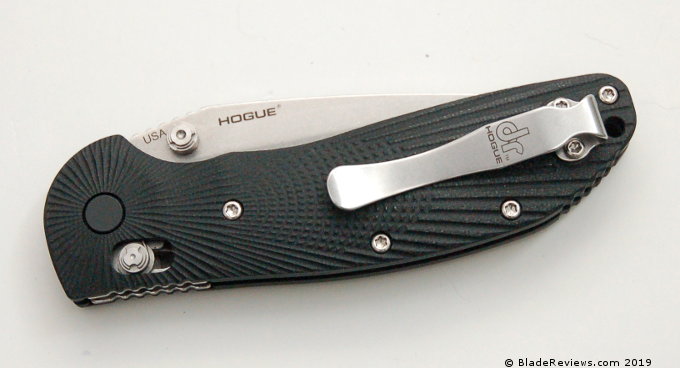
One interesting observation is that while the deep carry clip only uses 2 screws, the handle is drilled and tapped for 3 screws, so you may be able to pop a Benchmade clip on there, or an aftermarket clip.
Here is your shot of the knife in the pocket:
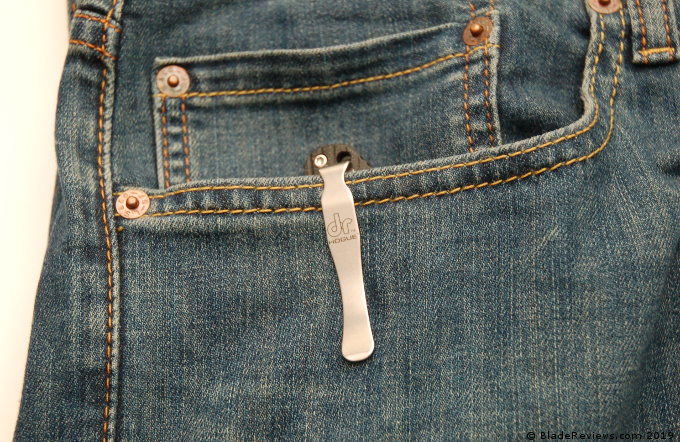
Deployment and Lockup
The MK1-G2 utilizes ambidextrous thumb studs. The thumb studs are large and easy to get to, and the blade pops out smoothly wish a brush of the thumb. Inside I can see thick phosphor bronze washers. Bearings are great for titanium framelock flippers, but I prefer the practicality of bronze washers for a true user piece like this MK1-G2. No complaints when it comes to getting this blade open, or the action.
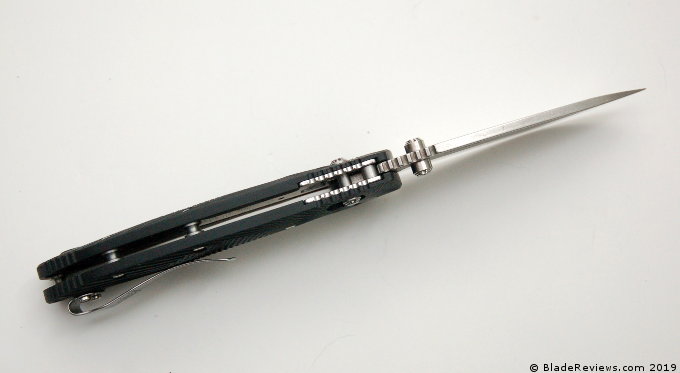
For lockup we have have the ABLE Lock. This is described as an enhanced Axis Lock and the acronym stands for “Ambidextrous Bar Lock Enhanced”. That doesn’t exactly roll off the tongue, but “ABLE Lock” works. For those wondering, Benchmade’s patent on the Axis lock expired in 2016, so that’s why this lock is able to be used. The lock’s finish and geometry is a little different from the Axis lock, but it looks and feels like an Axis Lock.
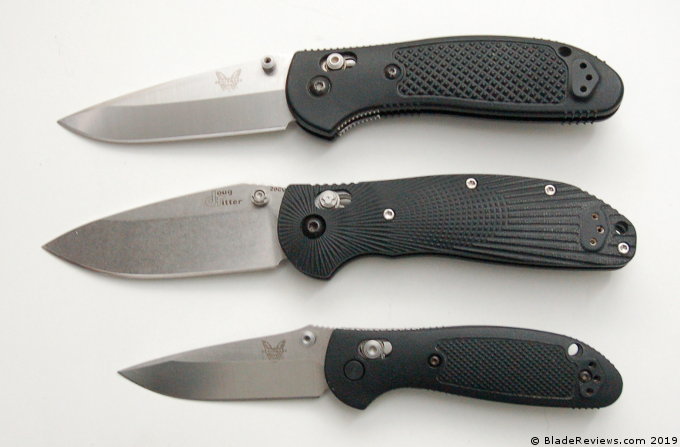
In practice this has been a convenient and reliable lock. It’s fully ambidextrous, and locks up tight. There is zero blade play in any direction. Fans of the Axis lock will find a lot here. Practically speaking I haven’t noticed much of a difference between this and the Axis lock. If anything the lock bar on the ABLE Lock feels slightly smoother.
Doug Ritter RSK® MK1-G2 Review – Final Thoughts
Dubbing this knife the “Generation 2” of the RSK MK1 is a fitting title. I think the G2 a worthy successor to the original, and is a true next generation piece. The knife has been re-considered from the ground up and it shows, but at the end of the day it still features the robust cutting geometry, good ergonomics, and easy operation that the original MK1 was known for.
Upgrading to G10 handle scales is bound to appeal to most folks. It makes the knife feel more solid and expensive, and the side to side blade play that is common in a lot of the FRN handled Griptilians is nowhere to be found. The flip side is that you have a heavier knife. The 20CV blade steel was another nice upgrade, especially for a piece like this that will get a lot of use. The rest of the knife has been thoughtfully reworked. From the deep carry pocket clip, to the 3-D sculpted handle scales, to the improved ABLE lock, no stone was left unturned with this build. I am sure Hogue and Doug spent countless hours engineering this knife.
My only criticism is that I’d like to see a stronger pocket clip. This new G-10 version is heavier than the old FRN Ritter Grip, and the clip could use some extra spring. Especially with the thin shorts I wear here in Florida.
Pocket clip quibble aside, the end result is a knife that just works. Regular readers know I have a soft spot for largish work knives like this. I view this as an enhanced version of something like a Para 2 or Griptilian, but it’s not such a nice knife that you will feel bad using it. This knife lacks the jewel like quality of the G-10 Griptilian, but I don’t think that’s a bad thing. The MK1-G2 was not designed to sit on a shelf, and I appreciate the practicality of it.
I can easily recommend this knife to fans of the original, or those looking for a premium folding work knife. It’s an excellent knife.
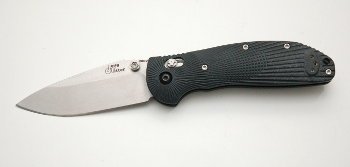
Doug Ritter RSK® MK1-G2 Review – From $159.95
From: KnifeWorks
The RSK MK1-G2 is available exclusively at KnifeWorks. Please consider that buying anything through any of the links on this website, including Amazon and BladeHQ helps support BladeReviews.com, and keeps the site going. Thank you very much.
Great review Dan! Question: is Doug Ritter the original designer of the Griptilian?
Hey John,
Thank you! Mel Pardue designed the original Griptilian.
Dan
I really like the shape of the blade. In addition it is a knife model that remains relatively affordable.
Functional problems with my knife are that the pivot is rust prone steel and that the lock bar is irregularly ground; therefore, contact with the tang is rough.
Haven’t noticed either of those issues with my knife. The lock bar is smooth on my piece. At least comparable with my Benchmades.
@Dan Jackson, My understanding is the original, Griptilian, was a collaboration between Pardue
and Ritter (the blade). I’m not sure what to think, though. Any evidence pointing to the story specifics?
Dan Jackson, My understanding is the original, Griptilian, was a collaboration between Pardue
and Ritter (the blade). I’m not sure what to think, though. Any evidence pointing to the story specifics?